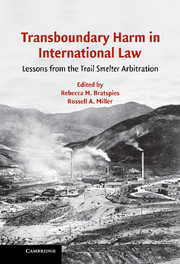Book contents
- Frontmatter
- Contents
- Contributors
- Acknowledgments
- Foreword by David D. Caron
- TRANSBOUNDARY HARM IN INTERNATIONAL LAW
- Introduction
- PART ONE THE TRAIL SMELTER ARBITRATION – HISTORY, LEGACY, AND REVIVAL
- PART TWO TRAIL SMELTER AND CONTEMPORARY TRANSBOUNDARY HARM – THE ENVIRONMENT
- 11 Trail Smelter in Contemporary International Environmental Law: Its Relevance in the Nuclear Energy Context
- 12 Through the Looking Glass: Sustainable Development and Other Emerging Concepts of International Environmental Law in the Gabčikovo-Nagymaros Case and the Trail Smelter Arbitration
- 13 Trail Smelter's (Semi) Precautionary Legacy
- 14 Surprising Parallels between Trail Smelter and the Global Climate Change Regime
- 15 Sovereignty's Continuing Importance: Traces of Trail Smelter in the International Law Governing Hazardous Waste Transport
- 16 The Legacy of Trail Smelter in the Field of Transboundary Air Pollution
- 17 The Impact of the Trail Smelter Arbitration on the Law of the Sea
- PART THREE TRAIL SMELTER AND CONTEMPORARY TRANSBOUNDARY HARM – BEYOND THE ENVIRONMENT
- Annex A Convention Between the United States of America and the Dominion of Canada Relative to the Establishment of a Tribunal to Decide Questions of Indemnity and Future Regime Arising from the Operation of Smelter at Trail, British Columbia
- Annex B Trail Smelter Arbitral Tribunal Decision, April 16, 1938
- Annex C Trail Smelter Arbitral Tribunal March 11, 1941, Decision
- Index
15 - Sovereignty's Continuing Importance: Traces of Trail Smelter in the International Law Governing Hazardous Waste Transport
Published online by Cambridge University Press: 08 September 2009
- Frontmatter
- Contents
- Contributors
- Acknowledgments
- Foreword by David D. Caron
- TRANSBOUNDARY HARM IN INTERNATIONAL LAW
- Introduction
- PART ONE THE TRAIL SMELTER ARBITRATION – HISTORY, LEGACY, AND REVIVAL
- PART TWO TRAIL SMELTER AND CONTEMPORARY TRANSBOUNDARY HARM – THE ENVIRONMENT
- 11 Trail Smelter in Contemporary International Environmental Law: Its Relevance in the Nuclear Energy Context
- 12 Through the Looking Glass: Sustainable Development and Other Emerging Concepts of International Environmental Law in the Gabčikovo-Nagymaros Case and the Trail Smelter Arbitration
- 13 Trail Smelter's (Semi) Precautionary Legacy
- 14 Surprising Parallels between Trail Smelter and the Global Climate Change Regime
- 15 Sovereignty's Continuing Importance: Traces of Trail Smelter in the International Law Governing Hazardous Waste Transport
- 16 The Legacy of Trail Smelter in the Field of Transboundary Air Pollution
- 17 The Impact of the Trail Smelter Arbitration on the Law of the Sea
- PART THREE TRAIL SMELTER AND CONTEMPORARY TRANSBOUNDARY HARM – BEYOND THE ENVIRONMENT
- Annex A Convention Between the United States of America and the Dominion of Canada Relative to the Establishment of a Tribunal to Decide Questions of Indemnity and Future Regime Arising from the Operation of Smelter at Trail, British Columbia
- Annex B Trail Smelter Arbitral Tribunal Decision, April 16, 1938
- Annex C Trail Smelter Arbitral Tribunal March 11, 1941, Decision
- Index
Summary
INTRODUCTION
The Trail Smelter arbitration occupies an ambiguous place in history. On the one hand, scholars revere it for being the first of only a few landmark cases that address transboundary pollution. On the other hand, scholars are prone to dismiss the case as a relic of a bygone era. The arbitration resolved itself thirty years before international environmental law was even in its nascent stages, and the case arose under unique circumstances when science had yet to reveal the threat human activities pose to the environment. Although praised for acknowledging the “no harm” principle, environmentalists lament the decision's implicit recognition of a right to pollute, “so long as the polluting activities do not cause ‘damage’ in the sense of direct injury … to a second state.”
Those scholars whose assessment of the Trail Smelter arbitration's place in history is less than generous, explain that times have changed. We are told that the Trail Smelter arbitration has limited modern applicability because many of the world's environmental problems no longer fit into Trail Smelter's traditional conception of transboundary pollution. States and other actors have turned away from resolving environmental disputes through adjudication, and instead have created elaborate regulatory regimes designed to address environmental concerns. The troubling aspects of the Trail Smelter arbitration, which appear to endorse a right to pollute, have been forgotten. For many commentators then, the basic teachings of the Trail Smelter arbitration are of marginal relevance to modern international environmental law.
- Type
- Chapter
- Information
- Transboundary Harm in International LawLessons from the Trail Smelter Arbitration, pp. 181 - 194Publisher: Cambridge University PressPrint publication year: 2006



